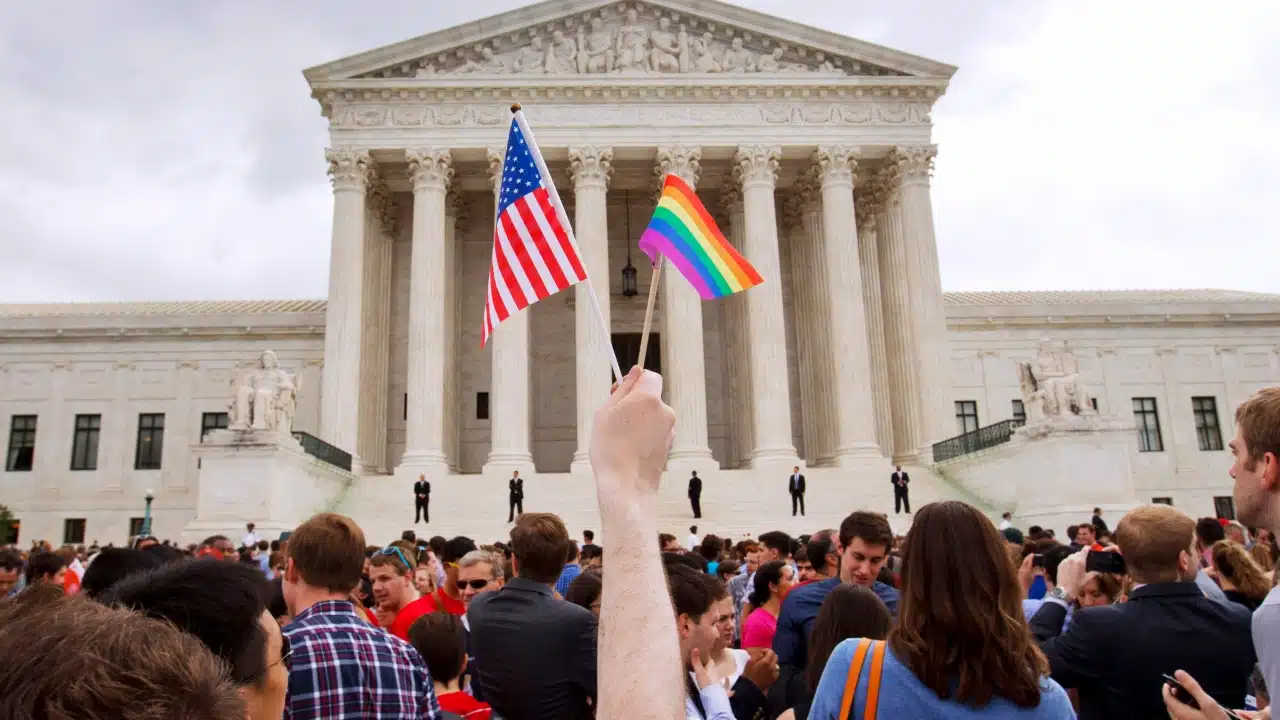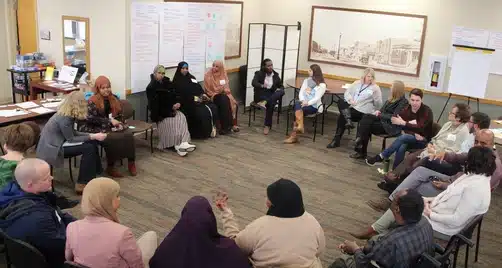WASHINGTON—The Close Up Foundation, through its National Network of Schools in Partnership (NNSP) division, brought students and educators to the nation’s capital in January for parallel three-day civic engagement conferences aimed at forging actionable plans for transforming their schools into civic hubs for community engagement.
 Student Symposium: Forging Future Leaders
Student Symposium: Forging Future Leaders
The Community Impact & Civic Leadership Symposium for students kicked off with an NNSP Impact-a-Thon, where students were given two hours to plan and film a 30-second video centered on the prompt: “How do we persuade politicians to pay attention to youth voices like the media pays attention to Taylor Swift and Travis Kelce?” The students rose to the occasion, with video vignettes covering a wide range of issues from podcasts sparking student awareness to the power of local protests.
In between study visits to memorials, student workshops featured young adult leaders detailing their paths into civic service. These included an origami-based strategy to influence policy issues by Close Up Manager of Student Programs Reese Arthur and a Zoom presentation by 2ndF Director of Impact Derek Rhodes on how he was inspired to tackle food insecurity in his community.
The impact of the Symposium culminated in the final day’s student presentations, action plans meticulously crafted by students to address community issues such as teen participation in school board elections and the protection of voting rights. Students later presented their action plans to educators at the corresponding NNSP Annual Conference.
Kimberly, a student attendee from McLean, Virginia, reflected on the experience, “We collaborated on identifying problems in our community and planning community engagement.” When asked how the Symposium fits her broader studies, she responded, “The biggest takeaway was collaboration on identifying problems and solving them. Everyone’s thoughts matter.”
 NNSP Annual Conference: Equipping Educators for Impactful Learning
NNSP Annual Conference: Equipping Educators for Impactful Learning
While entrusting their students to the instruction of Close Up staff and speakers, the NNSP Annual Conference offered educators a myriad of subject matter experts from the world of policy and education. Alice Siu, associate director of Stanford’s Deliberative Democracy Lab and a Close Up board member, shared studies on deliberative democracy and explored how artificial intelligence impacts the classroom. Close Up Manager of Professional Development Sante Mastriana took teachers through an exercise for facilitating nonpartisan classroom discussion on current events.
The civic engagement conference featured tangible examples of creating classes and programs that are not only engaging but also thought-provoking and stimulating for all students. Attendees immersed themselves in small workshops, larger keynotes, and panel presentations, further amplifying the impact of the shared knowledge and strategies.
“It’s so energizing to be surrounded by educators who truly believe that civic and community engagement experiences are essential in a student’s education and overall academic experience,” said Blake Kohn, a senior advisor at Close Up and executive director of the NNSP division.
 Close Up and NNSP Impact: Fostering Civic Engagement
Close Up and NNSP Impact: Fostering Civic Engagement
The dual impact of the student and teacher conferences underscored Close Up’s commitment to fostering civic engagement and empowering both students and educators. By crafting a collective civic vision and providing educators with tools for impactful teaching, this week in Washington, D.C., marked a turning point for many of these school communities who can now champion a more vibrant, interactive, and meaningful approach to civic education.
NNSP is a division of Close Up, with 200+ member organizations that include schools, educational access and enrichment programs, and policy and education reform groups. Longtime partners before merging in 2023, Close Up and NNSP offer curriculum consulting, professional development for educators, and Impact programming for schools and organizations seeking to enhance their community and civic engagement programs.
For more information, email us at nnsp@closeup.org.



 On November 12, 2019, the Supreme Court will hear arguments about the Trump administration’s efforts to end the immigration policy known as Deferred Action for Childhood Arrivals (DACA). The status of DACA recipients has been in limbo for over two years amidst administration actions and court injunctions.
On November 12, 2019, the Supreme Court will hear arguments about the Trump administration’s efforts to end the immigration policy known as Deferred Action for Childhood Arrivals (DACA). The status of DACA recipients has been in limbo for over two years amidst administration actions and court injunctions. On October 6, 2019, President Trump made the surprising announcement that he would pull out most of the 1,000 U.S. troops in Syria, where the United States has been working with the Kurdish-led Syrian Democratic Force (SDF) to fight the Islamic State of Iraq and Syria (ISIS), al-Qaeda, and Syrian President Bashar al-Assad, and to repel Russian and Iranian influence in the region. Apparently, this announcement was made without the knowledge of most of President Trump’s cabinet, including the State Department.1
On October 6, 2019, President Trump made the surprising announcement that he would pull out most of the 1,000 U.S. troops in Syria, where the United States has been working with the Kurdish-led Syrian Democratic Force (SDF) to fight the Islamic State of Iraq and Syria (ISIS), al-Qaeda, and Syrian President Bashar al-Assad, and to repel Russian and Iranian influence in the region. Apparently, this announcement was made without the knowledge of most of President Trump’s cabinet, including the State Department.1







